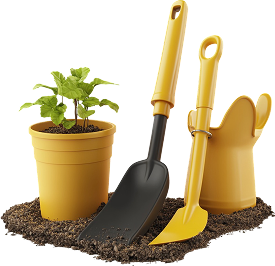Expert Garden Fence Installation in Gardening London
Why Choose Professional Garden Fence Installation?

Installing a garden fence in London is not just about enhancing the aesthetic appeal of your garden; it's also about ensuring security, privacy, and defining your outdoor space. Professional garden fence installation brings expertise and precision to the task, ensuring that your fence is both functional and visually appealing.
London's diverse climate can be challenging for fence materials, making professional installation crucial. Experts understand the local weather patterns and can recommend materials that withstand rain, wind, and occasional frost.
Moreover, professional installers have the necessary tools and experience to complete the job efficiently, saving you time and effort. They ensure that your fence is level, sturdy, and properly anchored, providing long-lasting results.
Types of Garden Fences Suitable for London Gardens
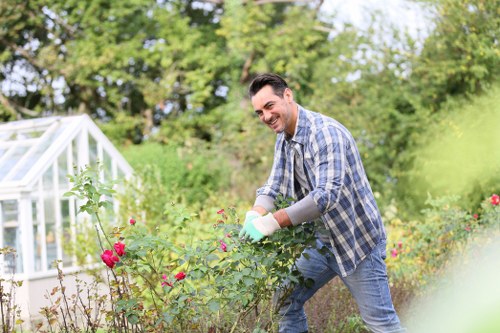
Choosing the right type of fence for your London garden depends on various factors, including the purpose of the fence, your garden's style, and maintenance preferences. Here are some popular options:
- Wooden Fences: Classic and versatile, wooden fences add a natural charm to any garden.
- Metal Fences: Durable and low-maintenance, metal fences are ideal for modern garden designs.
- Vinyl Fences: Resistant to weather and insects, vinyl fences offer longevity with minimal upkeep.
- Glass Fences: Perfect for contemporary gardens, glass fences provide unobstructed views while ensuring safety.
Each type of fence has its own set of benefits, and professional installers can help you choose the best fit for your specific needs.
The Garden Fence Installation Process
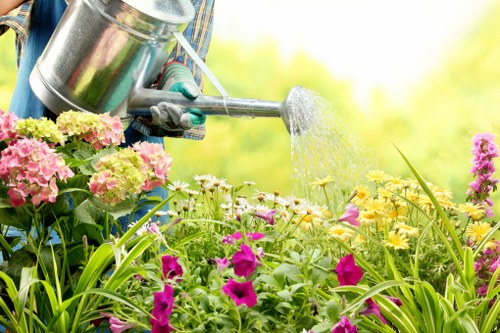
The installation process involves several key steps to ensure a successful outcome:
- Assessment: A professional will assess your garden space, considering factors like terrain, existing structures, and local regulations.
- Material Selection: Based on your preferences and the assessment, the right materials are chosen to match your garden's style and functional requirements.
- Preparation: The installation area is prepared by clearing any obstacles and marking fence line locations.
- Installation: The fence panels are erected, and posts are securely anchored, ensuring stability and longevity.
- Finishing Touches: Any additional elements, such as gates or decorative features, are installed to complete the fence.
Each step is handled with care to ensure that the final installation meets your expectations and enhances your garden's overall appeal.
Choosing the Right Materials for Your Fence
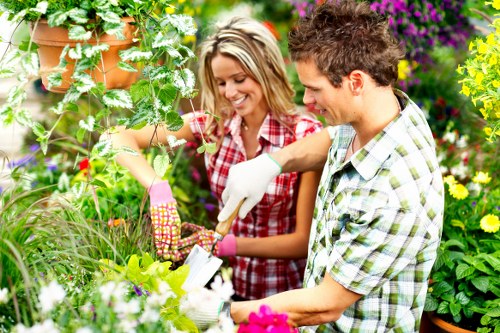
Selecting the appropriate materials is crucial for the durability and appearance of your garden fence. Here are some considerations:
- Wood: Offers a traditional look but requires regular maintenance to prevent decay.
- Metal: Provides strength and longevity with minimal upkeep, ideal for security purposes.
- Vinyl: Easy to clean and resistant to weather, making it a practical choice for busy gardeners.
- Composite: Combines the best of wood and plastic, offering durability and a natural appearance.
Professional installers can guide you in selecting materials that align with your budget, maintenance preferences, and aesthetic goals.
Enhancing Garden Aesthetics with Fencing
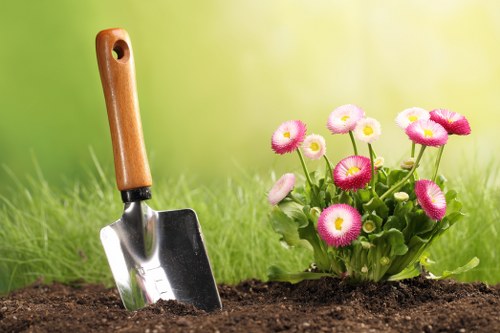
Beyond functionality, garden fences can significantly enhance the visual appeal of your outdoor space. Here are some ways to elevate your garden's look:
- Design Integration: Choose fence styles that complement your garden's existing design elements for a cohesive look.
- Color Coordination: Selecting colors that blend with your garden's palette can make the fence appear as a natural extension of your space.
- Decorative Features: Incorporate decorative panels, latticework, or ornamental post caps to add character to your fence.
- Greenery: Climbing plants or strategically placed hedges can soften the fence's appearance and add a touch of nature.
These enhancements not only beautify your garden but also increase your property's overall value.
Maintenance Tips for Longevity
Proper maintenance ensures that your garden fence remains in excellent condition for years to come:
- Regular Cleaning: Remove dirt, debris, and plant growth to prevent deterioration.
- Inspect for Damage: Periodically check for signs of wear, such as loose boards or rust, and address issues promptly.
- Repainting or Staining: For wooden fences, apply fresh coats of paint or stain to protect against weathering.
- Protective Treatments: Use sealants or protective coatings on metal or vinyl fences to enhance their resistance to the elements.
Consistent maintenance not only preserves the fence's appearance but also extends its functional lifespan.
Cost Considerations for Garden Fence Installation
Understanding the costs involved in garden fence installation helps in budgeting and making informed decisions:
- Material Costs: Different materials come with varying price points. For example, wood is generally more affordable than metal or glass.
- Labor Expenses: Professional installation fees depend on the fence's complexity, height, and length.
- Additional Features: Decorative elements, gates, and custom designs can add to the overall cost.
- Maintenance Budget: Consider the long-term maintenance expenses associated with different materials.
By evaluating these factors, you can choose a fencing solution that fits both your aesthetic desires and financial plan.
Local Regulations and Permits in London
Before installing a garden fence in London, it's essential to be aware of local regulations and permit requirements:
- Height Restrictions: Different areas may have specific limits on fence heights, especially in conservation areas or near historic sites.
- Material Guidelines: Certain materials might be restricted to maintain the area's aesthetic standards.
- Boundary Lines: Ensure that the fence is correctly placed within your property boundaries to avoid disputes.
- Planning Permissions: Some projects may require approval from local councils or planning departments.
Professional installers are typically well-versed in these regulations and can assist in ensuring that your fence complies with all necessary guidelines.
Benefits of a Well-Installed Garden Fence
A well-installed garden fence offers numerous benefits beyond mere enclosure:
- Enhanced Privacy: Create a secluded space where you can relax without overlooking neighbors or passersby.
- Increased Security: Deter unwanted visitors and protect your property from potential intruders.
- Boundary Definition: Clearly mark the limits of your property, preventing encroachments.
- Property Value: A stylish and sturdy fence can boost your home's curb appeal and overall value.
- Wind and Noise Reduction: Certain fencing materials can help block strong winds and reduce ambient noise levels.
These advantages make garden fences a worthwhile investment for any London homeowner.
How to Choose the Right Garden Fence Installer in London
Selecting a reputable and experienced installer is crucial for the success of your garden fencing project. Here are some tips to help you make the right choice:
- Check Credentials: Ensure that the installer is licensed, insured, and has a good reputation in the industry.
- Review Past Work: Look at portfolios or visit previous installations to gauge the quality of their work.
- Read Testimonials: Customer feedback can provide insights into the installer’s reliability and professionalism.
- Obtain Multiple Quotes: Comparing prices from different installers can help you find the best value for your budget.
- Ask About Warranties: A reputable installer should offer warranties on both materials and workmanship.
Taking the time to research and choose the right installer ensures a smooth installation process and a fence that meets your expectations.
Eco-Friendly Fencing Options
For environmentally conscious homeowners, there are eco-friendly fencing options available:
- Sustainably Sourced Wood: Choose wood from certified sustainable forests to minimize environmental impact.
- Recycled Materials: Metal or composite fences made from recycled materials reduce waste and promote sustainability.
- Living Fences: Incorporate plants and greenery into your fence design to create a natural barrier that improves air quality.
- Low-Emission Manufacturing: Opt for fencing materials produced with minimal environmental footprint.
These options not only contribute to environmental preservation but also add unique aesthetic qualities to your garden.
Maintaining Your Garden Fence
Regular maintenance is essential to preserve the integrity and appearance of your garden fence:
- Cleaning: Remove dirt, moss, and debris regularly to prevent buildup and deterioration.
- Repairs: Address any damage promptly to avoid further issues, such as rot in wooden fences or rust in metal ones.
- Painting or Staining: Apply protective coatings to wooden fences to shield them from moisture and pests.
- Inspecting Fasteners: Ensure that all screws, nails, and brackets are secure and replace any that are loose or corroded.
Consistent upkeep not only extends the life of your fence but also maintains its visual appeal and functionality.
Integrating Fencing with Garden Design
A well-integrated fence can enhance the overall design of your garden:
- Color Matching: Choose fence colors that complement your garden's palette and existing structures.
- Style Coordination: Select fence styles that align with the architectural style of your home and garden features.
- Functional Zones: Use fencing to create distinct areas within your garden, such as seating areas, vegetable plots, or play zones.
- Lighting Integration: Incorporate outdoor lighting into your fence design to highlight features and provide illumination at night.
By thoughtfully integrating fencing with your garden design, you create a harmonious and inviting outdoor space.
Common Mistakes to Avoid During Installation
To ensure a successful fence installation, be aware of and avoid common pitfalls:
- Poor Planning: Skipping the planning phase can lead to issues like incorrect measurements or unsuitable materials.
- Ignoring Local Regulations: Failing to adhere to local building codes and regulations can result in fines or the need to remove the fence.
- Selecting Inappropriate Materials: Choosing materials that don't suit the climate or your garden's needs can lead to premature deterioration.
- Improper Installation: Inadequate anchoring or uneven panels can compromise the fence's stability and appearance.
- Neglecting Maintenance: Overlooking regular upkeep can shorten the fence's lifespan and reduce its effectiveness.
By being aware of these mistakes, you can ensure a smooth installation process and a fence that serves its intended purpose effectively.
Cost-Saving Tips for Garden Fence Installation
While quality is paramount, there are ways to manage costs without compromising on your fence's effectiveness:
- Plan Ahead: Proper planning can prevent unexpected expenses during installation.
- Choose Affordable Materials: Opt for materials that offer a good balance between cost and durability.
- DIY Where Possible: Undertake certain tasks yourself, such as painting or staining, to save on labor costs.
- Bulk Purchasing: Buying materials in bulk can reduce the overall cost per unit.
- Seek Multiple Quotes: Comparing quotes from different installers can help you find competitive pricing.
Implementing these strategies can help you achieve a quality fence installation within your budget.
Benefits of Hiring Local London Installers
Choosing local installers for your garden fence offers distinct advantages:
- Local Expertise: Local installers understand the specific challenges and requirements of London gardens, such as soil conditions and climate.
- Quick Response: Being nearby, local professionals can respond swiftly to your needs and any potential issues during installation.
- Community Reputation: Local installers often rely on word-of-mouth and community reputation, ensuring a commitment to quality and customer satisfaction.
- Compliance Knowledge: They are well-versed in local regulations and can navigate permit requirements seamlessly.
Hiring local experts ensures that your fence installation is handled by professionals who are invested in maintaining their standing within the community.
Innovative Fencing Solutions for Modern Gardens
Modern gardens often require innovative fencing solutions that combine functionality with contemporary design:
- Smart Fences: Incorporate technology such as motion sensors and automated gates for enhanced security and convenience.
- Modular Designs: Use modular fencing components that can be easily rearranged or expanded as your garden evolves.
- Sustainable Materials: Embrace eco-friendly materials like recycled plastics or sustainably sourced wood for a modern, green approach.
- Integrated Seating: Combine fencing with built-in seating areas for a seamless and functional garden feature.
These innovative solutions cater to the needs of contemporary garden enthusiasts, offering both practicality and style.
Final Thoughts on Garden Fence Installation
A well-planned and professionally installed garden fence can transform your London garden, providing security, privacy, and aesthetic appeal. By understanding the different types of fences, materials, and installation processes, you can make informed decisions that enhance your outdoor living space.
Remember to consider local regulations, maintenance requirements, and your personal preferences when selecting the right fence for your garden. Investing in quality materials and professional installation ensures that your fence stands the test of time, offering lasting beauty and functionality.
Ready to elevate your garden with a stunning fence? Contact us today to discuss your garden fence installation needs and book your service now.
